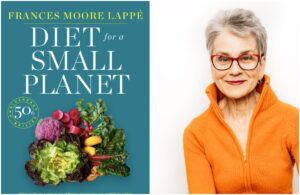Dr. T. Colin Campbell’s latest book, “The Future of Nutrition” is hard to put down. Here are a few excerpts that explain why we should only consume plant protein and keep our protein consumption to less than 10% of total calories. Dr. Campbell also sheds light on the phenomenon of “groupthink”, and why most people have never heard of the dangers of animal protein.
“Science makes it clear that a diet containing 35 percent of calories from protein produces radically different health outcomes than a diet containing 10 percent of calories from protein. The evidence is clear:
1. Chronic disease risk increases with even small intakes of animal-based protein;
2. Eating more animal-based foods is associated with eating fewer disease-protective whole plant foods;
3. Plant-based foods provide all the protein that is needed; and
4. There are numerous biological mechanisms, as discovered in laboratory-animal studies, to explain the damaging effect of eating more animal-based foods and fewer plant-based foods.
Increasing dietary protein intake to just 20 percent, much less 35 percent, has been shown to increase a range of serious health problems, including cancer, with each successive percentage increase associated with an increase in response, commonly referred to as a dose-response…While testing AF-contaminated peanuts in the Philippines and back home, I became aware of two phenomena: a seeming association between young Filipino children suffering from liver cancer and the consumption of animal protein, and the research results of a group in India testing the relationships among AF, liver cancer, and animal protein. Through this unlikely combination of circumstances, I came to see evidence of a surprising role for animal protein in developing liver cancer. I particularly wondered whether cancer growth initiated by AF might be accelerated by animal protein. Of course, this raised a serious issue for our project in the Philippines, and it put me in a difficult position. I could either continue advocating for the same high protein consumption and put these nagging questions out of my mind, or I could let them take me where they may, even if they led nowhere. I think all of my work these past sixty-five-plus years clearly indicates which path I chose, why, and where it led me. Nagging questions almost always lead to more nagging questions, and when it comes to one’s own biases, it’s even more important that these questions are asked. So, what did I discover?
In the lab, I discovered that animal protein (but not plant protein) dramatically increased experimental cancer growth, and I uncovered evidence of at least ten biological mechanisms by which this animal protein effect could be explained, both in the early initiation phase of cancer and the later promotion phase. In parallel, I also discovered a wide range of international correlation studies that show a linear correlation of animal protein (or surrogate nutrients like saturated fat, which are most frequently packaged with animal protein) with multiple cancers, cardiovascular disease, and other chronic diseases. Further, I found corroborating evidence from human intervention studies that have demonstrated the reversal of heart disease, diabetes, and other diseases with a diet free of animal-protein-based foods…The primary point I would like to make here is this: at some point in my career, whether by naïveté, clumsiness, or some other defect, I unwittingly undermined the most sacred, tacit agreement that binds together virtually all researchers in the field of nutrition—our centuries-old veneration of animal protein. The community’s response to my conclusions testifies to the indelible imprint of animal protein on our collective imagination.”
GROUPTHINK: THE INVISIBLE FENCE
Unsurprisingly, groupthink has had an “extensive reach . . . in the field of communications studies, political science, management, and organizational theory.”43 Perhaps the most common example of the phenomenon is when organizations get caught up in a scandal: even those not directly implicated look the other way, and misconduct is “covered up in the hopes of saving the institution’s reputation, and the money that accompanies it.” The reason this happens is because institutions “inspire emotion. They inspire loyalty. And they have established ways of doing things that rev up when problems surface . . . most relevantly, they often have a community built around them, geographically or otherwise.
Click here for a link to Dr. T. Colin Campbell’s excellent book “The Future of Nutrition.”




